词汇学1
- 格式:rtf
- 大小:57.78 KB
- 文档页数:25
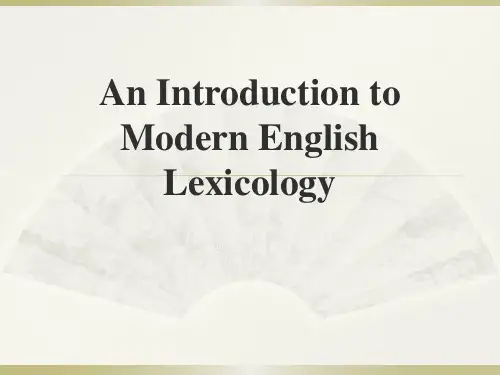

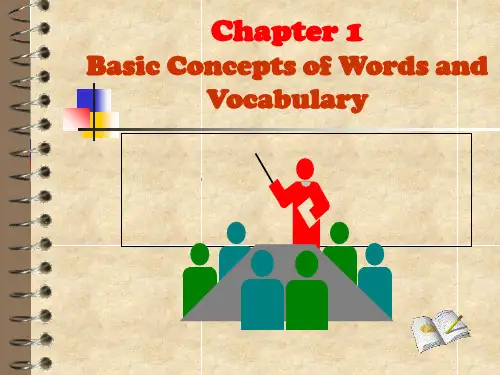
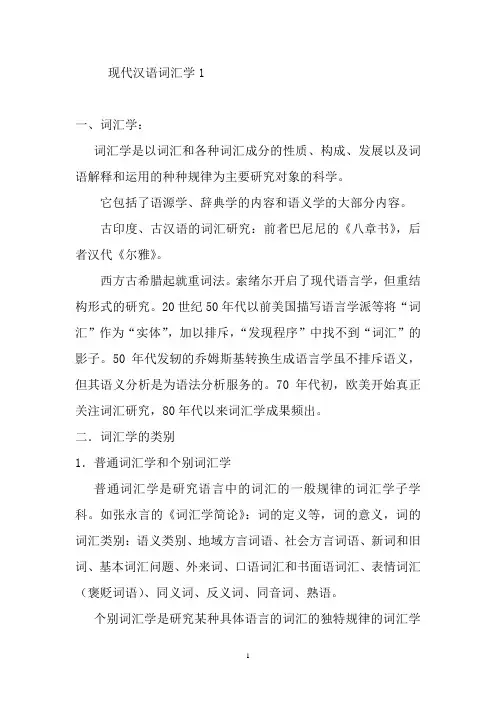
现代汉语词汇学1一、词汇学:词汇学是以词汇和各种词汇成分的性质、构成、发展以及词语解释和运用的种种规律为主要研究对象的科学。
它包括了语源学、辞典学的内容和语义学的大部分内容。
古印度、古汉语的词汇研究:前者巴尼尼的《八章书》,后者汉代《尔雅》。
西方古希腊起就重词法。
索绪尔开启了现代语言学,但重结构形式的研究。
20世纪50年代以前美国描写语言学派等将“词汇”作为“实体”,加以排斥,“发现程序”中找不到“词汇”的影子。
50年代发轫的乔姆斯基转换生成语言学虽不排斥语义,但其语义分析是为语法分析服务的。
70年代初,欧美开始真正关注词汇研究,80年代以来词汇学成果频出。
二.词汇学的类别1.普通词汇学和个别词汇学普通词汇学是研究语言中的词汇的一般规律的词汇学子学科。
如张永言的《词汇学简论》:词的定义等,词的意义,词的词汇类别:语义类别、地域方言词语、社会方言词语、新词和旧词、基本词汇问题、外来词、口语词汇和书面语词汇、表情词汇(褒贬词语)、同义词、反义词、同音词、熟语。
个别词汇学是研究某种具体语言的词汇的独特规律的词汇学子学科。
如陆国强的《现代英语词汇学》。
2.词汇的历时研究和共时研究历时研究:历史比较词汇学和历史词汇学。
两者都是一种纵向的研究,研究词汇发展规律。
不同的是:前者研究亲属语言词汇间、不同方言词汇间的词语的同源关系及不同的发展轨迹。
后者研究具体语言词汇的发展演变规律,共时研究:也叫描写词汇学。
是一种横向研究,横断面式的研究。
也有人这样来分类:根据研究对象和方法的不同,词汇学可以分为普通词汇学、具体词汇学、静态词汇学和历史词汇学等。
(1)普通词汇学研究各种语言词汇的共同现象和规律;(2)具体词汇学研究某一具体语言或方言的词汇现象和规律;(3)静态词汇学研究某一时期的词汇现象和规律;(4)历史词汇学研究词汇发展演变的现象和规律。
现代汉语词汇学属于具体词汇学和静态词汇学。
三.现代汉语词汇学的研究对象和任务(一)研究对象普通话词汇为研究对象。
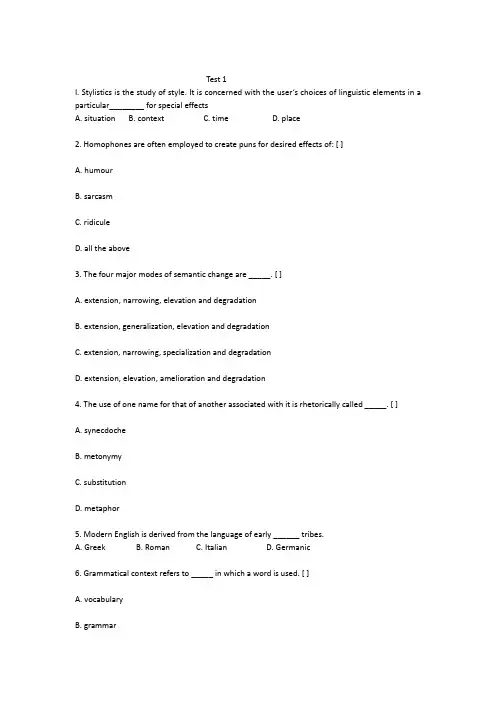
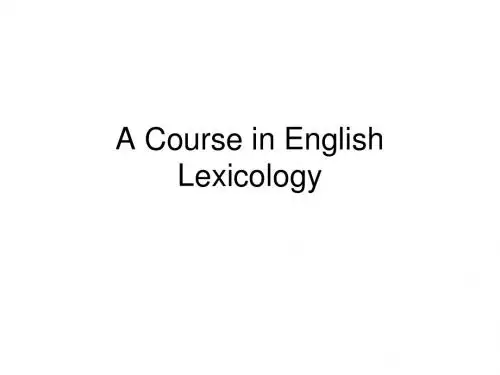
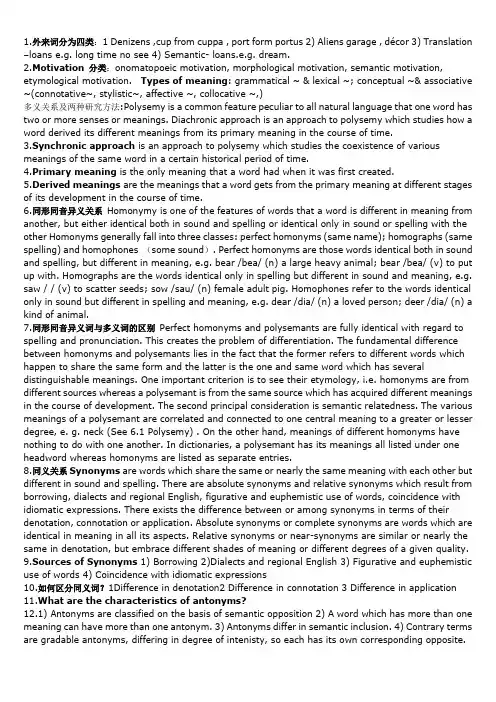
1.外来词分为四类:1 Denizens ,cup from cuppa , port form portus 2) Aliens garage , décor 3) Translation –loans e.g. long time no see 4) Semantic- loans.e.g. dream.2.Motivation 分类:onomatopoeic motivation, morphological motivation, semantic motivation, etymological motivation. Types of meaning: grammatical ~ & lexical ~; conceptual ~& associative ~(connotative~, stylistic~, affective ~, collocative ~,)多义关系及两种研究方法:Polysemy is a common feature peculiar to all natural language that one word has two or more senses or meanings. Diachronic approach is an approach to polysemy which studies how a word derived its different meanings from its primary meaning in the course of time.3.Synchronic approach is an approach to polysemy which studies the coexistence of various meanings of the same word in a certain historical period of time.4.Primary meaning is the only meaning that a word had when it was first created.5.Derived meanings are the meanings that a word gets from the primary meaning at different stages of its development in the course of time.6.同形同音异义关系Homonymy is one of the features of words that a word is different in meaning from another, but either identical both in sound and spelling or identical only in sound or spelling with the other Homonyms generally fall into three classes: perfect homonyms (same name); homographs (same spelling) and homophones (some sound). Perfect homonyms are those words identical both in sound and spelling, but different in meaning, e.g. bear /bea/ (n) a large heavy animal; bear /bea/ (v) to put up with. Homographs are the words identical only in spelling but different in sound and meaning, e.g. saw / / (v) to scatter seeds; sow /sau/ (n) female adult pig. Homophones refer to the words identical only in sound but different in spelling and meaning, e.g. dear /dia/ (n) a loved person; deer /dia/ (n) a kind of animal.7.同形同音异义词与多义词的区别Perfect homonyms and polysemants are fully identical with regard to spelling and pronunciation. This creates the problem of differentiation. The fundamental difference between homonyms and polysemants lies in the fact that the former refers to different words which happen to share the same form and the latter is the one and same word which has several distinguishable meanings. One important criterion is to see their etymology, i.e. homonyms are from different sources whereas a polysemant is from the same source which has acquired different meanings in the course of development. The second principal consideration is semantic relatedness. The various meanings of a polysemant are correlated and connected to one central meaning to a greater or lesser degree, e. g. neck (See 6.1 Polysemy) . On the other hand, meanings of different homonyms have nothing to do with one another. In dictionaries, a polysemant has its meanings all listed under one headword whereas homonyms are listed as separate entries.8.同义关系Synonyms are words which share the same or nearly the same meaning with each other but different in sound and spelling. There are absolute synonyms and relative synonyms which result from borrowing, dialects and regional English, figurative and euphemistic use of words, coincidence with idiomatic expressions. There exists the difference between or among synonyms in terms of their denotation, connotation or application. Absolute synonyms or complete synonyms are words which are identical in meaning in all its aspects. Relative synonyms or near-synonyms are similar or nearly the same in denotation, but embrace different shades of meaning or different degrees of a given quality.9.Sources of Synonyms 1) Borrowing 2)Dialects and regional English 3) Figurative and euphemistic use of words 4) Coincidence with idiomatic expressions10.如何区分同义词?1Difference in denotation2 Difference in connotation 3 Difference in application11.What are the characteristics of antonyms?12.1) Antonyms are classified on the basis of semantic opposition 2) A word which has more than one meaning can have more than one antonym. 3) Antonyms differ in semantic inclusion. 4) Contrary terms are gradable antonyms, differing in degree of intenisty, so each has its own corresponding opposite.13.上下义关系:Hyponymy deals with the relationship of semantic inclusion. That is, the meaning of a more specific word is included in that of another more general word. Superordinates refer to some general words; subordinates denote those more specific words. Hyponymy can be described in terms of tree-like graphs, with higher-order superordinates above the lower subordinates. But their status either as superordinate or subordinate is relative to other terms. For example, horse, dog, pig are subordinates in relation to animal, but superordinates of mare, hound and boar, Animal itself becomesa subordinate of creature. And creature in turn becomes14.词义变化的种类There are five types of meaning, changes: extension, narrowing, degradation, elevation, and transfer among which extension and narrowing are the most common. Changes in meaning can be accounted for from extra-linguistic factors (historical reason, class reason, and psychological reason) and intra-linguistic factors (shortening, the influx of borrowing, and analogy).15.词义的扩大Extension is a process by which a word with a specialized sense is generalized to cover a broader or less16.definite concept. Compare the following;词义的缩小Narrowing is a process by which a word of wider meaning acquires a specialized sense;词义的升华Elevation is a process by which a word moves from a derogatory or neutral sense to a neutral and/or appreciative sense;词义的降格Degradation is a process by which a word of reputation slides into a pejorative use,;词义的转移Transfer is a process by which a word denoting one thing changes to refer to a different but related thing. Paper serves as an example. This word formerly denoted an African plant papyrus, which was once used to make paper. In modern times, paper is made from rags, wood, straw and the like, but the product has retained the same name. There is associated transfer. There are other kinds of transfer, such as, concrete to abstract, abstract to concrete and transfer of sensation.17.语境的种类:非语言语境。
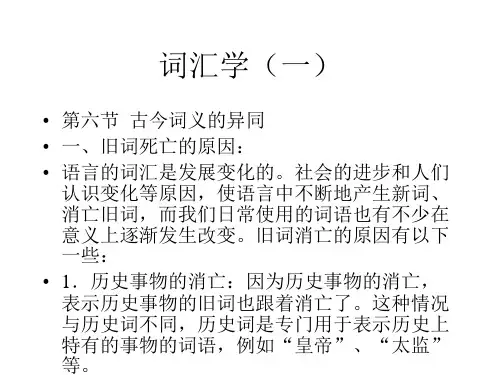
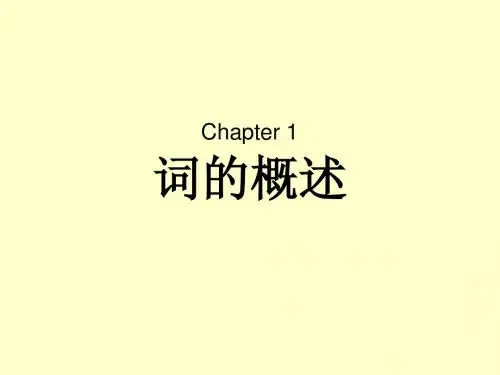
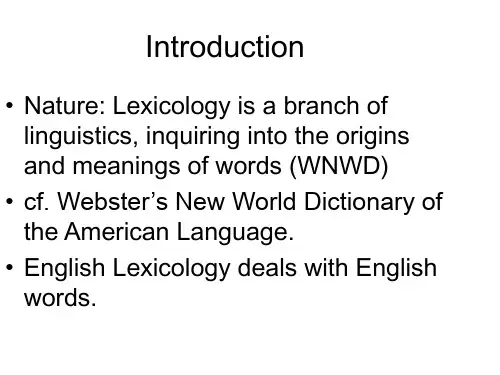
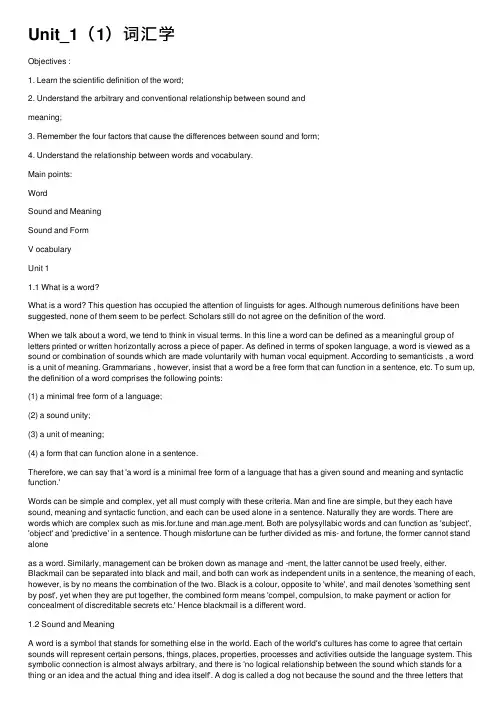
Unit_1(1)词汇学Objectives :1. Learn the scientific definition of the word;2. Understand the arbitrary and conventional relationship between sound andmeaning;3. Remember the four factors that cause the differences between sound and form;4. Understand the relationship between words and vocabulary.Main points:WordSound and MeaningSound and FormV ocabularyUnit 11.1 What is a word?What is a word? This question has occupied the attention of linguists for ages. Although numerous definitions have been suggested, none of them seem to be perfect. Scholars still do not agree on the definition of the word.When we talk about a word, we tend to think in visual terms. In this line a word can be defined as a meaningful group of letters printed or written horizontally across a piece of paper. As defined in terms of spoken language, a word is viewed as a sound or combination of sounds which are made voluntarily with human vocal equipment. According to semanticists , a word is a unit of meaning. Grammarians , however, insist that a word be a free form that can function in a sentence, etc. To sum up, the definition of a word comprises the following points:(1) a minimal free form of a language;(2) a sound unity;(3) a unit of meaning;(4) a form that can function alone in a sentence.Therefore, we can say that 'a word is a minimal free form of a language that has a given sound and meaning and syntactic function.'Words can be simple and complex, yet all must comply with these criteria. Man and fine are simple, but they each have sound, meaning and syntactic function, and each can be used alone in a sentence. Naturally they are words. There are words which are complex such as mis.for.tune and man.age.ment. Both are polysyllabic words and can function as 'subject', 'object' and 'predictive' in a sentence. Though misfortune can be further divided as mis- and fortune, the former cannot stand aloneas a word. Similarly, management can be broken down as manage and -ment, the latter cannot be used freely, either. Blackmail can be separated into black and mail, and both can work as independent units in a sentence, the meaning of each, however, is by no means the combination of the two. Black is a colour, opposite to 'white', and mail denotes 'something sent by post', yet when they are put together, the combined form means 'compel, compulsion, to make payment or action for concealment of discreditable secrets etc.' Hence blackmail is a different word.1.2 Sound and MeaningA word is a symbol that stands for something else in the world. Each of the world's cultures has come to agree that certain sounds will represent certain persons, things, places, properties, processes and activities outside the language system. This symbolic connection is almost always arbitrary, and there is 'no logical relationship between the sound which stands for a thing or an idea and the actual thing and idea itself'. A dog is called a dog not because the sound and the three letters thatmake up the word just automatically suggest the animal in question. It is only symbolic. The relationship between them is conventional because people of the same speech community have agreed to refer to the animal with this cluster of sounds. In different languages the same concept can be represented by different sounds. Woman, for example, becomes Frau in German, femme in French and fùn? in Chinese. On the other hand, the same sound [mi:t] is used to mean meet, meat, mete. Knight and night, though denoting entirely different things, yet have the same sound.1.3 Sound and FormIt is generally agreed that the written form of a natural language is the written record of the oral form. Naturally the written form should agree with the oral form. In other words, the sound should be similar to the form. This is fairly true of English in its earliest stage i.e. Old English. The speech of the time was represented very much more faithfully in writing than it is today. With the development of the language, more and more differences occur between the two. The internal reason for this is that the English alphabet was adopted from the Romans, which does not have a separate letter to represent each sound in the language so that some letters must do double duty or work together in combination.Another reason is that the pronunciation has changed more rapidly than spelling over the years, and in some cases the two have drawn far apart. During the last five hundred years, though the sounds of speech have changed considerably, there have been no corresponding changes of spelling.A third reason is that some of the differences were created by the early scribes. In the early days the spelling differences did not matter very much as people were not so used to seeing words in print, and the spelling was not fixed as it is today. As a result, no one was quite sure how some English words should be spelled. Sometimes, people deliberately changed spelling of words either to make a line even or for easier recognition. Before the printing press was brought to England, everything was written by hand. Those scribes, who made a living by writing for other people often workedin haste to meet the needs of the King, Church, and merchants. One problem was that several letters written with short vertical strokes such as i, u, v, m, w and n looked all alike. Consequently, their handwriting caused misunderstanding. To solve the problem in part, they changed the letter u to o when it came before m, n, or v. This is how sum, cum, wuman, wunder, munk came to be written as some, come, woman, wonder, monk. At some point, too, the scribes seem to have decided that no English word should end in u or v. Thus, in time, an e was added to such words as live, have, due, and true but not pronounced.In the late 1500, printing became well established. It helped to freeze the spelling of words. The standardization makes spelling sacred. Dictionaries did their share in stopping spelling changes. Meanwhile, sounds continued to change as usual, thus bringing more differences.Finally comes the borrowing, which is an important channel of enriching the English vocabulary. When English borrowed words from other languages, it borrowed spelling as well. The early borrowings were assimilated and the later ones, however, do not conform to the rules of English pronunciation and spelling, e.g. stimulus (L), dénouement (F), fiesta (Sp), eureka(Gr), and kimono(Jap).The written form of English is, therefore, an imperfect representation of the spoken form. From time to time in history, some British and American scholars have made efforts to reform the English spelling, but with little success. In spite of the differences, at least eighty percent of the English words fit consistent spelling patterns. And even those spellings that appear to be irregular may have more regularity and usefulness than we realize. In such words as hymn, condemn, bomb, for example, the last letter of each is silent. But when these words are extended into longer ones, the silent letters become audible: hymnal, condemnation and bombard. This is a general rule.1.4 V ocabularyAll the words in a language make up its vocabulary. The term 'vocabulary' is used in different senses. Not only can it refer to the total number of the words in a language, but it can stand for all the words used in a particular historical period, e.g. Old English vocabulary, Middle English vocabulary and Modern English vocabulary. We also use it to refer to all the words of a given dialect, a given book, a given discipline and the words possessed by an individual person. English is one of the world's highly developed languages. Naturally the vocabulary is one of the largest and richest. The general estimate of the present-day English vocabulary is over one million words.Exercise:Which of the following is NOT true?A. A word is the smallest form of a language.B. A word is a sound unity.C. A word has a given meaning.D. A word can be used freely in a sentence.Answer ADecide whether the following are true or false.1. A word can be defined in different ways from different points of view.2. Under no circumstances can sound and meaning be logically related.3. The introduction of printing press resulted in a lot more differences between sound and form.4. The words a person can use in speaking and writing form his active vocabulary. Answer 1. T 2. F 3. T 4. TWhat is vocabulary?Answer V ocabulary is most commonly used to refer to the sum total of all the words of a language. It can also refer to all the words of a given dialect, a given book, a given subject and all the words possessed by an individual person as well as all the words current in a particular period of time in history.Explain the relationship between sound and meaning with examples.Answer Sound is the physical aspect of a word and meaning is what the sound refers to. Sound and meaning are not intrinsically related and their connection is arbitrary and conventional. For example, tree /tri:/ to 树in Englisn because the English-speaking people have agreed to do so just as Chinese people use /sh?/ to refer to the same thing. This explains why people of different languages use different sound to express the same concept. Even I the same language, the same sound can have different meanings e.g. /rait/ can mean right, rite and write.。
第一章1.A word is a minimal free form of a language that has a given sound, meaning and syntactic function.2. V ocabulary refers to the sum total of all the words in a language. In other words, vocabulary is composed of words and words make up vocabulary. If we compare vocabulary to a family, words are family members.3. Sound is the physical aspect of a word and meaning is what the sound refers to. Sound and meaning are not intrinsically related and their collection is arbitrary and conventional. For example, tree/tri:/ means 树in English because the English-speaking people have agreed to do so just as Chinese people use/shù/(树) to refer to the same thing. This explains why people of different languages use different sounds to express the same concept. However, in the same languages, the same sound can denote different meanings, e.g. /rait/ can mean right, rite, and write.4. There are generally four major causes of the differences between sound and form.⑴There are more phonemes than letters in English, so there is no way to use one letter to represent one phoneme.⑵The stabilization of spelling by printing, which breaks the synchronized change of sound and spelling. ⑶influence of the work of scribes, who deliberately changed the spelling of words and ⑷borrowing, which introduces many words which are against English rules of pronunciation and spelling.5 .Early scribes changed the spelling of many words while copying things for others because the original spelling forms in cursive writing were difficult for people to recognize, such as sum, cum, wuman, munk and so on. Later, the letter u with vertical lines was replaced with o, resulting in the current spelling forms like some, come, woman, monk. The changed spelling forms are more distinguishable to readers.6. Words of the basic word stock form the common core of the English language. They are the words essential to native speakers’ daily communication. Such words are characterized by all national character, stability, polysemy, productivity and collocability.7. a. loose woman b. fellow c. pistol d. great e. cowardf. fightg. policeh. drunki. womanj. girl8. haply = perhaps albeit= althoughmethinks = it seems to me eke= alsosmooth= truth morn= morningtroth= pledge ere= beforequoth = said hallowed= holybillow= wave/ the sea bade= bid9. Neologisms refer to newly-coined words or old words with new meanings. For example, euro(欧元),e-book(电子书),SARS(非典), netizen (网民), are newly-coined words. Words like mouse(鼠标),web(网络),space shuttle(航天飞机) etc. are old words which have acquired new meanings.10. By notion, words fall into content words and functional words. Content words include nouns, verbs, adjectives, adverds and numerals, which have clear notions; whereas functional words are void of notions but are mainly used to connect content words into sentences. Content words are numerous and changing all the time, while functional words are small in number and stable. But functional words have much higher frequency in use than content words.11. Native words form a small portion of the English vocabulary, but they make up the mainstream of the basic word-stock which belongs to the common core of the English language. Compared with most loan-words, native words are mostly essential to native speakers’ daily communication and enjoy a much higher frequency in actual use.12. Denizens Aliens Translation loans Semantic loanskettle confrere chopsticks dreamdie pro patria black humourskirt parvenu long time no seewall Wunderkind typhoonhusband Mikado第二章1. The Indo-Europe Language Family is one of the most important language families in the world. It is made up of the languages of Europe , the Near East and India. English belongs to this family and the other members of the Indo-European Language Family have different degrees of influence on English vocabulary . A knowledge of the Indo-European Language Family will help us understand English words better and use them more appropriately.2.Indo-European Language FamilyBalto-Slavic (Lithuanian,Prussian, Polish, Slavenian, Russian, Bulgarian) Indo-Iranian (Hindi, Perian)Celtic (Breton, Scottish, Irish)Italic(Spanish, French, Italian, Portuguese, Roumanian)Hellenic(Greek)Germanic(English, Swedish, German, Norweigian, Icelangic, Danish, Dutch)3.The vocabularies of the three periods differ greatly from one anther. OldEnglish has (1) a small vocabulary (50 000—60 000), (2) a small number of borrowings from Latin and Scandinavian only and (3) the words full of endings. Middle English has (1) a comparatively large vocabulary, (2) a tremendous number of foreign words from French and Latin and (3) word endings leveled. Modern English has (1) a huge and heterogeneous vocabulary, (2) tremendous borrowings and (3) words with lost endings.Yes, we can divide the developments in other ways, for example, Old English period can be called Anglo-Saxon period. And Middle English might start from 1066, the time of Norman Conquest. But in doing so, the logical continuation of thee three phases of the original division is lost.4. It is receptivity and adaptability of the English language that make it possible for English to borrow heavily from other major languages of the world, so that the English vocabulary eventually has become heterogeneous.5. The popularity of English lies in the fact that English is ready to borrow from other languages and to adapt itself to new situations and new developments, that it has accepted elements from all other major languages and that it has simple reflection and a relatively fixed word order. All these make the language comparatively easy to learn and to use.6. course human events necessary peopledissolve political connected assume powersseparate equal station nature entitle decentrespect opinions requires declare causes impelseparationFrom the words picked out, we can see that most of the content words are either of Greek or Latin origin. What we left are mostly functional words. This shows that Greek and Latin play a very important part in the English vocabulary.7. Latin borrowing can be divided into four phase: (1)Pre-Anglo-Saxon period,(2)Old English period, (3) middle English period and(4) Modern English period. Borrowings in the first period are mainly common words such as wall, wine, kettle and so on; words borrowed in the second period are mainly religious terms such as candle, nun, church; the third period saw word borrowed often via French such as frustrate, history, infancy and so on and in the forth period Words borrowed from Latin are usually abstract formal terms like status ,nucleus , minimum. 8. eventful [Latin + English] hydroplane [Greek +Latin ]Falsehood [Latin +English ] pacifist [Latin +Greek ]Saxophone [German +Greek ] heirloom [French +English ]Joss house [Portuguese +English ] television [Greek + Latin ]9. amateur (late) finace (late)Empire (late) peace (early)Courage (early) garage (late)Judgement (early) chair (early)Chaise (late) grace (early)Servant (early) routine (late)Jealous (early) savate (late)Genre (late) gender (early)Debut (late) morale (late)State (early) chez (late)Ballet (late)10. Jes persen’s comment reveals the importance of Scandinavian words in English. Just as people cannot live without bread and eggs, so English language cannot operate properly without Scandinavian words.11. allegro f . 轻快Alto i. 女低音Andante j 行板Crescendo b.渐强Diminuendo g. 渐弱Forte e.强Largo d.缓慢Piano h. 轻Pianoforte a.轻转慢Soprano c.女高音12. cherub(Hebrew)chipmunk(American Indian )Chocolate(Mexican ) coolie(Hindi)Cotton (Arabic) jubilee (Greek)Lasso (Spanish) loot (Hindi)Sabbath (Hebrew) shampoo (Hindi)Snorkel (German) tamale (Mexican)Tepee (American) tulip (Turkish)V oodoo (African) kibitz (German)Wok (Chinese) sauerbraten (German)13. a.alligator b.lococ.rodeod..bonanzae.igloof.blitzkriegg.wigwam h.canoei.hurricane j.boomerangk.poncho14. the characteristics of the contemporary vocabulary can be summarized as follows: (1) the vocabulary is huge in size and heterogeneous; (2) it has tremendous borrowings from all other major languages of the world; (3) the words have lost their endings; (4) it is growing swiftly by means of word-formation because of the development of science and technology, social, economic and political changes and influence of other cultures and languages.15. the major modes of vocabulary development of contemporary arecreation, that is by means of word-formation; semantic change, adding new meanings to old words; borrowing words from other language and revival of old-fashioned words, which has a insignificant role.第三章1.a.morpheme b.allomorphc.bound morphemed.free morphemee.affixf.inflectional affixg.derivational affix h.rooti.stem j.base2. inflectional morphemes are the suffixes added to the end of words to denote grammatical concepts such as –s(-es), -ed, -ing and –est (to show superlative degree of adjectives and adverbs) whereas derivational morphemes are prefixes and suffixes added to words to form new words such as pre-, dis-, un-, -tion, -er, -ness and so on.Grammatical morphemes are those used to show grammatical concepts, including inflectional suffixes as mentioned above and functional words (prepositions, pronouns, articles, auxiliary verbs), for example, but, the, do and Was; lexical morphemes are derivational affixes including both prefixes and suffixes3. Individualisticindividualist + ic [stem , base]individual + ist [stem, base ]individu + al [stem, base ]in + dividu [root, stem, base ]undesirablesun +desirable [stem, base ]desir + able [root, stem, base ]free morpheme =free root4. morpheme{Bound rootbound morpheme { inflectional affixaffix{ prefixderivational affix {suffix第四章Enumerate the three important means of word formation and explain their respective role in the expansion of English vocabulary.The three means of word formation are affixation ,which creates 30% to 40% of the total number of new words ;compounding ,which brings 28%to 30% of all the new words.;and conversion ,which provides English with 26% of the new words.Affixation1.Affixation,also called derivation,is the formation of new words by adding affixes to stems.Affixation Includes prefixation and suffixation according to the types of Affixes used to forms new words.2.Prefixation is to create new words by adding prefixes to base while suffixation makes new words by adding suffixes to base.3.Generally speaking,prefixes do not change part of speech of base but only modify their meaning whereas suffixes do change part of speech but seldom modify the meaning of bases.4.The best way to classify prefixes is on the basis of meaning because prefixes only change the meaning of bases in general.5. non-smoker incapable impracticaldisobey insecurity irrelevant immature inability/disability unofficially unwillingness illegal disagreement illogical disloyal inconvenientnon-athletic6. harden horrify modernize memorize falsify apologizedeepen glorify sterilizelengthen intensify beautifyfatten sympathizea. apologizeb. beautifyc. lengtheningd. sympathizede. to fattenf. falsify/hardeng. memorizing h. Sterilize7. a. employee b. politician c. participantd. waitresse. conductorf. teacherg. pianist h. examinee/examiner8.trans- = across: transcontinental, trans-worldmono- = one: monorail, monoculturesuper- = over, above: superstructure, supernaturalauto- = self: autobiography, automobilesub- = bad, badly: malpractice, malnutritionmini- = little, small: minicrisis, miniwarpre- = before: prehistorical, preelectionex- = former: ex-teacher, ex-filmerCompounding1. The three criteria are(1)stress pattern, that is, stress in a compound falls on the first element but on the second in a free phrase, e.g. '- -(compound), - ' -(free phrase);(2)meaning, that is, the meanings of a compound is usually not the combination of the meaning of thecomponent parts, but the free phrase is, e.g. hot line(compound: busy line),hot potato(free phrase: potato which is hot);(3)grammatical unity, that is, the different elements form a grammatical unit, which does not allow internal change, e.g. easy chair(compound: a special arm chair),easier chair(free phrase: a less easy chair).However, every rule has expectations. The same is true of the criteria. Three are examples against each of the three rules.2. heartbeat [S + V] brainwashing [V + O]movie-goer [place + V.-er] baking powder [ adv+n.]far- reaching [Adv+v.-ing] dog-tired [adv + adj]lion-hearted [adv + n.-ed] love-sick [adv + adj]boyfriend [S + complement] peace-loving [V +O]snap decision [V + O] easy chair [ adj+ n]on-coming [adv+v] tax-free [adv +adj]light-blue [adj + adj] goings-on [V +adv]Whereas conversation is the derivation of new words by adding zero affixes, such as single(adj.)→single(v.).3. There are two ways to form verb compounds. For example, first name (v. from first name)and honeymoon (v. from honeymoon)are words created by means of conversion: words such as proofread (v. from proofreading)and chain-smoke (v. from chain smoker)are formed by means of backformation.4.well-bred 有教养的well-behaved 守规矩的culture-bound 含文化的homebound 回家的needle work 针织品homework 家庭作业praiseworthy 值得表扬的respectworthy 值得尊敬的bar-woman 吧女sportswoman 女运动员nationwide 全国的college-wide 全校的clear-minded 头脑清晰的strong-minded 意志坚强的military-style 军事风格的newstyle 新款self-control 自制self-respect 自尊budget-related 有预算的politics-related 与政治相关的water-proof 防水fire-proof 防火once-fashionable 曾经流行的once-powerful 曾经强大的news-film 新闻片news-letter 时事通讯mock-attack 演习mock-sadness 假悲伤sister-in-law 嫂/弟媳妇father-in-law 岳父/公公home-baked 自家烤的home-produced 自制的half-way 半途的/半路的half-done 半生不熟的ever-lasting 永久的ever-green 常青的age-conscious 年龄敏感的status-conscious 身份敏感的campus-based 以校园为基地的market-based 基于市场的Conversion1.conversion is the formation of new words by turning words of one partof speech to those of another part of speech. The term functional shift reveals the actual function of conversion,i.e.change of the functions of words.the term zero-derivation approaches conversion from the perspective of derivation because it is a way of deriving new words by adding zero affixes,hence zero derivation.2.Although both are called derivation ,suffixation is the derivation of new words by adding suffixes to bases,such as simple (adj.)→simplify(v.)G.modernizing h.sterilize7. a.employees b.politician c.participantsD.waitress e.conductor f.teacherG.pianist h.examinee,examiner8.trans-=across:transcontinental,trans-world9.Mono-=one:monorail,monoculture10.Super-=over,above:superstructure,supernatural11.Auto-=self:autobiography,automobile12.Sub-=below:subculture,subconscious13.Mal-=bad,badly:malpractice,malnutrition14.Mini-=little,small:minicrisis,miniwar15.Pre-=before:prehistorical,preelection16.Ex-=former:ex-teacher,ex-filmer3 The classes most frequently involved in conversation are nouns and verbs.4 Verbs converted to nouns usually are related to the original verbs in six different ways.The new nouns converted from verbs refer to (1)state of mind or sensation,e.g .desire(state of desiring); (2) event or activity ,e.g.swim (the activity of swimming );(3) result of the action,e.g. buy (the result of buying);(4) doer of the action,e.g.bore (the person whom bores); (5) tool or instrument ,e,g, paper (doing something with paper ) and (6) place,e.g. turn(the place of turning).Nouns converted to verbs are generally related to the original nouns in sever different ways . The new verbs usually mean (1) to put in or on the noun,e. g. peel (to remove the peel from );(4) to do with the noun,e.g. Shoulder (to do something with shoulder); (5) to be or act as the noun,e. g. tutor (to be the tutor) ;(6) to make or change into the noun, e.g. cash (7) to send or go by the noun ,e. g. ship (to send by ship).5.When adjectives are converted into nouns ,some are completely changed ,thus known as full conversation, and others are partially changed ,thus known as partial conversion.Adjectives which are fully converted can achieve a full noun status, i. e. having all the characteristics of nouns .That means they can take a / an shorts ,finals.Adjectives which are partially converted still keep adjective features.They should always be used with the ,and they cannot take -s/-esto show plural forms.Moreover ,the words can have comparative or superlative degrees: the poor ,the poorer ,the young, the very unfortunate.6.The changes occasionally involved are (1) change of spelling accompanied by pronunciation ,e. G. Life/laIf/→live/liv/ , breath /breɚ/→breathe /br i:ỏ/ and blood /blʌd/→ bleed / bli:d/ ;(2) change of pronunciation and stress ,e. g. use . n /ju :s / → use v. / ju:z / and permit n. /'p :mit/→ v. /p 'mit / and so on.7.a .stomach 【n.→v.】 b. Room 【n.→ v.】c. wolf [n → v]d. come/go [v → n]e. familiar [a → n]f. innocent [a → n]g. flat [a → n]h. ah/ ouch [int → v]i. warm [a → n]j. has-been/might-have-been [finite v → n]k. Hamlet [proper n → v]l. buy [v → n]m. smooth [a → v]Blendingmotel (mo tor + ho tel)汽车旅馆humint (hum an + int elligence) 情报advertisetics (advertise ment + statis tics) 广告统计学psywarrior (psy chological warrior) 心理战专家hoverport (hover craft + port) 气垫船码头chunnel (ch annel + t unnel) 海峡隧道hi-fi (hi gh + fi delity) 高保真音响cinemactress (cinem a + actress) 女电影演员Clippingcopter (heli copter) front clippingdorm (dorm itory) back clippinglab (lab oratory) back clippingprefab (pref abricated house) phrase clippinggas (gas oline) back clippingprof (prof essor) back clippingscope (tele scope) front clippingchamp (champ ion) back clippingsarge (serge ant) back clippingmike (mic rophone) back clippingad (ad vertisement) back clippingtec (de tec tive) front and back clippingAcronymy1.Yes, there is a difference between them. The difference lies in theformation and pronunciation. Initialisms are formations pronounced letter by letter, e.g. UFO(unidentified flying object), BBC(B ritish B roadcasting C orporation), VIP(very important person) and acronyms are formed to conform to the rule of spelling and pronunciation, that is, the words look and sound like ordinary words, e.g. AIDS/eidz/(acquired immune deficiency syndrome), MAD(mutually assured destruction), radar(radio detecting and ranging).2. kg =k ilogram ft=f oot cf =c onfercm=c entimeter $=d ollar ibid = i bidemetc. = e t cetera VIP=v ery i mportant p ersonOPEC=O rganization of P etroleum E xporting C ountriesTOEFL=t est of E nglish as a f oreign l anguage3. a. SALT b. radar c. AIDSd. BASICe. Laserf. WHOg. sonar h. G-manBackformation1.It is true that both are means of making new words by removing theend part of the words . But they have differences . For aback-formed word , what is removed is the supposed suffix ,e.g.auth------author , donate------donation , loaf-----loafer , the forms–-or,--ion , --er coincide with the their suffixes . For back clipping , however , what is removed is usually different from the existingsuffixes ,e.g. ad------advertisement , gas-------gasoline ,exam------examination , etc.se (laser)escalate(escalator)Babysit (babysitter) peeve (peevish) Orate (orator) commute(commuter)Communization of proper namesa.Tantalize -------Tantalus : to tease or torment by keeping sth. wantedout of reachb.Argus-eyed--------Argus : to be extremely watchfulc.narcissim--------Narcissus : excessive admiration of oneself or one’sappearanced.sabotage-------Sabots : (1) to destroy or damage deliberately(2) deliberate damage ordestructione. martinet--------Martinet : strict /stern (military) trainerf . yahoo-------Yahoo : a lout or ruffiang. Shylock--------Shylock : a ruthless money lenderh. hovering-------Hoover : cleaning by using a vacuum cleaner。
Check Your UnderstandingState whether each of the following statements is TRUE or FALSE.a. Fb. Fc. Fd. Fe. TIn-Class Activities1. The word “wor d”is diverse in terms of its meaning. Consider its usages in the following contexts:a. May I say a word about that?b. Actions speak louder than words.c. She has kept her word.d. Finally the general gave the word to retreat.e. Let me know if you get word of my wife.f. Word has it they’re divorcing.ASK:(1) What does “word” mean in each of the contexts?a. Something he would talk aboutb. things that are said, contrasted with things that are donec. the promise one has maded. spoken command or signale. informationf. piece of news; message(2) Do you know of any other usages the word “word” has?2.ASK:(1) Can you summarize the five criteria introduced by David Crystal here?Potential pause :The pause , which happens when you say a sentence, will tend to fallbetween words, and not within words.Indivisibility: The extra items will be added between the words and not within them.Minimal free forms: the smallest units of speech that can meaningfully stand on their own. Phonetic boundaries: It is sometimes possible to tell from the sound of a word where it begins or ends.Semantic units: each word in a sentence has a clear meaning.(2) Do you think these criteria are questionable in any way? Can they be applied to theidentification of zi, the rough Chinese equivalent of the English “word”?No, as the above analysis explained. No , they cannot. For example, 流连and 蹒跚,they are danchuci(单纯词) which cannot be analyzed independently.3.(1) Suppose we want to know what are the ten most frequently used English words. What are they, as far as you can tell? How about Chinese?The, of ,to, and, a, in, is, it, you, that的、一、是、在、了、不、和、有、大、着(2) Are there any similarities and differences between the ten most frequently used words inEnglish and those in Chinese?They are basically functional words. Both have possessive word,(of, 的) number words(a,一), copula words(is, 是), conjunctions(and, 和) and localizers(in, 在).; English has the definite article the and several pronouns, you , that and it which are absent in Chinese.4. According to Ferdinand de Saussure, there is no intrinsic relation between the form of a word and what it stands for. In other words, words are arbitrary (i.e. not motivated) in terms of meaning designation. However, there seem to be abundant cases in natural languages that defy this generalization. For example, onomatopoeic words seem to exist in all the languages known to us. To a lesser degree, the meaning of some words can be partly deduced from their components. For example, “sl-“ is highly suggestive of the meaning of the words that contain it, such as “slide”, “slip”, and “slush”.ASK:(1)Babble, bang, grunt, splash; 噼啪、嗡嗡、滴滴哒、吱嘎吱No, these words are only a small part of English or Chinese vocabulary(2)Football and handball concern the body part which take the ball from one place to another, and basketball is named after a basket into which the ball is put in the begging stage of the game. (3)People have bodily embedded knowledge to infer these motivations of such usage. The first example concerns the metaphor and second metonymy(4) Do you know other types of words or usages that are motivated in one way or another?Some figurative usages are also highly motivated. For example: Necessity is the mother of invention.5. British English (BE for short) and American English (AE for short) are two major varieties of the English language.Though they have fundamental similarities in terms of grammar and vocabulary, they also differ substantially in many ways. On the vocabulary level, several distinct distinctions are found. First, there are differences in the pronunciation of some words, mostly in the vowel sounds, as illustrated in the following table:Some consonants are also pronounced differently. Particularly, in BE,the letter r before a consonant is not pronounced, but that at the end of a word is pronounced if the next word begins with a vowel, e.g., cart /k: t/, door /d :/, but a member of /☜ memb☜☜f /; in AE, the letter r is pronounced in all positions.Secondly, BE and AE differ in the spelling of some words. Usually, the AE variants are simpler than their British counterparts, as manifested below.A further noticeable difference relates to the lexical meaning of some words. For instance, “bill” means “bank note” in AE but “a demand for payment of a debt” in BE.ASK:(1) Can you supply more words that are pronounced differently in British English and AmericanEnglishhalf, advance, advantage, after, answer, ask, glance, glass, grasp(2) Do you know of any grammatical differences between British English and American English? In American English we say “graduate from school”; while in British English, we say “leave school”. In American English, it has “put up price”, while in British English, it is “raise price”(3) Are there special words for which AE and BE have very distinctive spellings?For Chinese characters“博览会”, British English has “fair” while American English usees trade show. “ Life and elevator” , and “autumn and fall” are more examples.(4) Can you find more examples of the same words with different meanings in AE and BE?one billion/ first floor/ pantsone billion(Brit) the number 1000000000000 万亿之数(US) the number 1000000000十亿之数first floorIn British English the floor of a building at street level is the ground floor and the floor above thatis the first floor.In US English the street-level floor is the first floor and the one above is the second floorPants(Brit) men's underpants; women's or children's knickers(US) trousers6. The following excerpt comes from Barack Obama’s speech on Father’s Day, June 15, 2008. Read it carefully, and pay special attention to his choice of words.ASK:(1) How does Obama distinguish “empathy” from “sympathy”?Empathy means Identification with and understanding of another's situation, feelings.The ability to stand in somebody else’s shoesSympathy is defined as feeling of pity and sorrow (for sb.)(2) Why does Obama bother to define “hope”– a familiar word to all?Hope, according to Obama, is something b etter is waiting for us if we’re willing to work for it and fight for it. If we are willing to believe. He differentiates hope from what is blind optimism or willful ignorance of the problems we face(3) What other lexical choices impress you deeply as well?“As fathers and parents”, why not as fathers and mothers,Open to discussionPost-Class Tasks1. What characteristics do functional words have?Read the following excerpt from George W.2. How do you understand receptive and productive lexical knowledge? Use your own examples to illustrate their differences. Which type of vocabulary is probably the largest for a language user, reading vocabulary, writing vocabulary, listening vocabulary, or speaking vocabulary? Give one reason that convinces you most.For example, we learn that “word”can be used to refer to “rumor”, and we know it means “rumor” in the sentence “The word is that he's left the country.(据说他已经离开这个国家了).”But actually, we will not write the sentence, esp., say the sentence in daily conversations. By this example, we show that receptive lexical knowledge concerns what you learned and productive lexical knowledge concerns what you would put into practice. Reading vocabulary may be the largest type of vocabulary, because you may recognize the meaning of a word without using it in daily exchanges or in academic writing.3. Is lexical competence the same thing as productive lexical knowledge? How do you understand the two concepts on the basis of the discussion in Pre-Class Reading?No, lexical competence covers a larger scope that that of productive lexical knowledge.4. Can we say lexicology is the scientific study of the words in a language? How important is the notion of word equivalent? Read the following excerpt from Barrack Obama’s Victory Speech in 2008 and underline the word equivalents. What types of word equivalents are contained in this passage?Language is composed of not just individual words, but also word equivalents, such as word groups (or compound words), chunks such as idioms, formulaic sequences, and so. The latter is attracting more and more scholarly attention these days. Thus, lexicology is more precisely defined as the scientific study of the words and word equivalents in a language.5. Identical systems of stress and rhythm are used by BE and AE. There are, however, a few wordsthat have their stress on a different syllable. Write out the specific pronunciations of the following words:OmittedUnit 2Check Your UnderstandingState whether each of the following statements is TRUE or FALSE.a. Fb. Fc. Fd. Fe. FIn-Class Activities1.(1) How are the three allomorphs conditioned by their adjoining sounds?S is pronounced as [s] [z and [iz]] when it is respectively attached to a voiceless consonant, a voiced consonant or a vowel, and any words ending with s, z or pronouncing as [s] or [z].(2) Does the plurality morpheme have other allomorphs apart from those mentioned above? Yes, for example,the plural form of sheep remains unchanged, and man has its plural form realized as “men”.(3) What about the allomorphs of the morpheme for the past tense in English?The usual allomorphs of the morpheme of the past tense may be realized as [t], [d] and [id]2. In English, there are quite a few prefixes that connote negation. They include a-, un-, in- (ir-, il-), dis-, mis-, non-, de-, and the like.symmetry→asymmetrytypical→atypicalforgettable →unforgettabletie→untiearticulate →inarticulate,discreet →indiscreetmature →immature,partial →impartiallegal →illegallegible →illegiblerelevant →irrelevantreverent →irreverentlike→dislikeable→disableuse →misuselead →misleadsense →nonsensecommercial→noncommercialform→deformconstruction→deconstruction(2) How would you distinguish between un- and non- in terms of their meaning and use? Can weprefix un- to adjectives like “tall”, “ill”, and “black”? Why or why not?Un- is usually prefixed before transitive verbs, such as tie →untie, nouns, such as and adjectives, such as employment→unemployment. Non- is often put before adjectives, such as essential→non-essential, and nouns, such as existence→non-existence. Both of the usage are possible because the word followed the above two prefixes has no ready-made acronyms in English lexical system.3.ASK:(1) Could we cut “unwomanly” into “unwoman” and “-ly”?No. unwoman is not a word in English. Un- is usually put before an abstract uncountable noun. (2) Can you analyze the morphological structure of the word “inaccessibility”?inaccessibilityinaccessible -ityin- accessibleaccess -ible(3) According to some feminists, words like “history” and “human” encode sex inequality. Do youagree?These words may connate sex inequality at first sight. But, In fact, we go too far if we hold this notion in mind. Both words have been part of our culture.4.ASK:(1) What are the words in the pictures that stem from conversion?Stop, bin, wear, suit(2) Are they instances of partial conversion or complete conversion?complete conversions5.ASK:(1) What words undergo shortening here? What is the full form of PM (or sometimes p.m.)?Tue Tuesday, Sun Sunday, post meridiem.(2) Do you know how the month names are shortened in English?1月January Jan 2月February Feb 3月March Mar. 4月April Apr. 5月May May 6月June Jun. 7月July Jul. 8月August Aug. 9月September Sept. 10月October Oct. 11月November Nov. 12月December Dec.6.ASK:(1) Can you provide more examples instantiating analogy?Marathon--telethon/talkathon, hamburger--shrimpburger-(2) Is this process of word formation also found in Chinese? Support your answer with evidence.无微不至-无胃不治;其乐无穷-棋乐无穷7.(1) What semantic relation holds the two lexemes together in each case?a. flu virus: A caused Bb. safety line :B ensures Ac. night bird: A is the usual time when B is actived. spoon-feeding: A is one of the ways to realize B.e. potato pancake: A is the ingredient of Bf. man-made: B is realize by Ag toilet seat: B is part A.(2) Does “safety line” mean the same as “safe line”? Can you come up with similar compounds? NO, the former means that line can keep one safe, whereas the latter means the line is safe.(You can touch it)Security guard and secure guardPost-Class Tasks1. Supply the best answer from the four choices marked A, B, C, and D.a.D;b.B;c. D;d. C;e. A;f. D2. Learners need to be able to recognize word parts in words. Read the example and break up the following words into meaningful parts. (e.g. unhappiness -- un/happi/ness)a. intangibilityb. unevenlyin/tangible/ity un/even/lyc. friendlinessd. notwithstandingfriend/ly/ness not/with/stand/inge. overseasf. minimalistover/sea/s minim/al/istg. immigration h. Psychologistimmi/grate/ion psych/ology/isti. occurrences j. assumptionoc/cur/rence as/sumpt/ion3. Study the following Security Tips collected from an American Holliday Inn and exemplify the various processes of word formation with words from the passage.Safe: conversionCheck-out: CompositionDead: conversionValuable: conversion4. What kinds of adjectives undergo partial conversion? What kinds of verbs often undergo complete conversion?Adjectives like “poor”, “rich”, “fat”, “sick”, “wounded”, “deaf”, “mute”, “Chinese”, “Danish”, “best”, “most”, “least”, “latest”, “accused”, “condemned”, (for) “good”, “thick”(and) “thin”, etc. undergo partial conversion; stop, pause, halt, look, rest, check, try, taste, smell, etc, often undergo complete conversion.5. Some affixes have not only lexical meanings but affective meanings as well. Some personal nouns formed by the suffix –ling, for example, have derogatory meanings,as in hireling, weakling; some personal nouns taking the suffix –ish are also derogatory, as in mannish, womanish and bookish. Can you provide more examples suffixed with –ling and –ish that are negative in attitude?Prince/princelingUnder/underlingWorld/worldingChild/childishSelf/selfishFool/foolish6. Read the following piece of news. What are the acronyms or initialisms used in this passage? What are their full forms?Obama brings hope for warmer relations to TurkeyANKARA, Turkey – U.S. President Barack Obama is reaching out to Turkey to helpInitialisms: EU, ABC, U.S.。
葛本仪:《现代汉语词汇学》读书笔记第一章对词汇的再认识第一节词汇的内容一、词汇的界定及其性质1.“词汇”是一个指称词的集体的概念,是表示词的总和的意义的。
我们在一些著述中能够经常见到一些解释,如:“语言中所有的词构成所谓语言的词汇”(斯大林语),“一部书中所用的词的总和就叫做词汇”,或者说不论在什么情况下,“词的总称就叫做词汇”等等。
在日常交际中,在某种语境下,这样的解释是完全正确的。
但是从语言研究的角度来考虑,用词汇学的科学术语的含义来要求,这种解释显然就不够严格和正确了。
要给词汇作出正确的界定,还必须从词汇的性质谈起。
2.词汇的性质:早在50年代,斯大林就已经指出:“拿词汇本身来说,它还不是语言,——它好比是语言的建筑材料。
建筑业中的建筑材料并不就是房屋,虽然没有建筑材料就不可能建成房屋。
同样,语言的词汇也不就是语言,虽然没有词汇,任何语言都是不可想象的。
但是当语言的词汇受着语言语法的支配的时候就会获得极大的意义。
”斯大林这段话今天看来,尽管有许多不完善的地方,但是它总也提出了词汇的基本性质和作用。
在语言中,应该说,作为语言的建筑材料的成分很多,这就要看是在什么范围内,什么条件下,充当什么样的建筑材料等问题。
例如形成为音位的音素只能是音节的建筑材料,词素只能是词的建筑材料等。
对于词汇来说,它作为建筑材料,其作用是为了构成句子,也就是说词汇作为建筑材料,就是用来组成言语以进行交际的,因此,作为造句的材料就是词汇的功能和性质。
根据词汇的这一特点,应该承认,凡是具有这种功能和性质的语言成分,都应该属于词汇的范围之内,例如成语、惯用语等等,因为它们虽然都是由词组成的词组形式,但是它们却都是一种组句的备用单位,都具有和词一样的建筑材料的性质和作用,语言词汇当然不应该而且也不能够把这类成分排斥在词汇之外。
因此我们认为,词汇应当是一种语言中所有的词和所有的相当于词的作用的固定结构的总汇。
所以,任何种语言的词汇都包括着两个基本的内容:①该语言中所有的词的总汇②所有的相当于词的作用的固定结构的总汇。
1、选择题10题20% 前三章概念2、填空题5题15% 前三章3、搭配题10% 前四章4、名词解释题5题10% 如loan words prefix5、简答题课后问题How why what 15%6、分析题提供一个单词对此词做出分析15%评论题用例子评论观点是否正确15%题型例如一、选择题:1. The following are all nominal suffixes EXCEPT( ) . A. –fulEnglish and ( ) belong to the Germantic branch of the Indo-European language family. B. Danishadded to the end of words to indicate Grammatik relationships are known as ( )morphemes. C. inflectionalattached to other morphemes to create new words are known as ( ) affixes. B .derivational二、.Complete the following statements with proper words or expressions 填空题1. affixation Is the formation of new words by adding prefixes to bases.2. Almost all affixes are bound morphemes because few as independent words.三、配对四、Define the following terms. 名词解释题五、Answer the following questions,简答题Why should students of English lexicology study the Indo-European Language FamilyThe Indo-European Language Family is one of the most important language families in the world. It is made up of most of the languages of Europe, the Near East and India. English belongs to this family and the other members of the Indo-European Language Family have different degrees of influence on English vocabulary. A knowledge of the Indo-European Language Family will help us understand English words better and use them more appropriately.六、1. Analyze the morphological structures of the following words and point out the types of the morphemes. 1Destructive de+struct+tive 2antibiotic anti+bio+tic3composition com+po+si+tion 4unbearable un+bear+able5international inter+nation+nal 6ex-prisoner ex+prison+er2. The word “deer” originally meant “animal”, but now it refers to a specific animal.What kind of word-meaning change has the word experiencedWhat accounts for the change of word-meaning1) The word “deer” has experienced narrowing or specialization of meaning.2) The narrowing of word-meaning is caused by the influx of borrowings, one of the major linguistic factors leading to the change of word-meaning. The word “deer” originally meant “animal”, and later the word “animal” from Latin and the word “beast” from French found their way into English. As the three terms were synonymous, “animal” retained the original meaning, the meaning of “deer” was narrowed and “beast” changed in colour.Chapter 1: a word may be defined as a fundamental unit of speech and minimum free form; with a unity of sound and meaning (both lexical and grammatical meaning), capable of performing a given syntactic function.A word isa minimal free form of a language;a sound unity;a unity of meaning;a form that can function alone in a sentence.A word is a minimal free form that has a given sound and meaning and syntactic functionA word is a smallest unit of a language.is the language of a highly colloquial type, considered as below the level of standard educated speech, and consisting either of new words or of current words used in some social sense.are the terms peculiar to a class, sect, trade or profession.means the vocabulary peculiar to the underworld.5.Classification of English Words According to Different CriteriaBy origin:native words ,borrowed wordsBy usage:common words,literary words,colloquial words,slang words,technical wordsBy notion:function words,content wordsnative words features:1. All-national character Every English person uses the words of the native element.2. Great stability The native element lives for centuries providing the English with a basis for the formation of new words.3. Monosyllabic The native element in Modem English is mostly monosyllabic.4. Word-forming ability The great stability and semantic peculiarities of Anglo-Saxon words account for the great word building power.5. Wide collocability Many native words enter quite a number of set expressions, idioms, phrases and proverbial sayings.6. Plurality of meanings Most of the native words have undergone striking transformations in semantic structure, and are nowadays highly polysemantic7. High frequency value The native element (words of Anglo-Saxon origin) forms the bulk of the most frequent elements used in any style of speech8. Stylistically neutral Most native words are stylistically neutral.Classification of the borrowed words:Aliens: are words borrowed from a foreign language without any change of the foreign sound and spelling. From French: elite, coupéDenizens: are foreign words which have been conformed to native English in accent, spelling and even in adoption of an English affix, or words made up of two parts both from foreign soil.get (a Scandinavian borrowing)theater (a French loan) sociology (socio- from French and -logy from Greek)Translation-Loans: are words and expressions formed from the material already existing in English, but according to patterns taken from another language, by way of literal morpheme-for-morpheme translation. black humour (from French humor noir)found object (from French object trouve)Semantic Loan words: are words of a new meaning due to the influence of a related word in another language, or words which acquired new meanings under the influence of language or languages other than the source tongue.(gift meant “the price of a wife” in Old English and after the semantic borrowing of the meaning of gift or present of the Scandinavian term gipt, it meant and still means “gift” in the modern sense of it. )Classification of English Words by usageCommon words are connected with the ordinary things or activities necessary to everyday life.Literary words are chiefly used in writing, especially in books written in a more elevated style, in official documents, or in formal speeches. They are comparatively seldom used in ordinary conversation. In English, most of the literary words are of French, Latin or Greek origin. For example, cast (throw), edifice (building), endeavor (try), purchase (buy), etc. More examples: recognition, distinction, inclination, dubious, amelioration… colloquial words or expressions are used mainly in spoken English, as in conversation among friends and colleagues. They can also be use in informal writings, but are inappropriate in formal speeches or writings.They are marked colloq. or informal in dictionaries. Such as: kid, guy, fellow, gay…区别literary word and colloquial word and common wordYou have got to pay fines for overdue books. (colloquial)Slang word is defined as language, words or phrases of a colorful, humorous, or taboo nature, invented for specific occasions, or uses, or derived from the unconventional use of the standard vocabulary. The chief reason for the formation and use of slang expressions is to secure freshness and novelty.Technical words refer to those words used in particular disciplines and academic areas. = terminologies or technical terms. symphony, sonata, orchestra, concerto,audiovisual, microteaching,algebra, geometry, calculus,clone, embryo, cell , organism, DNA(deoxyribonucleic acid), geneFunction words (or grammatical words or autosemantic words) are words that have little lexical meaning or have ambiguous meaning, but instead serve to express grammatical relationships with other words within a sentence, or specify the attitude or mood of the speaker. Function words might be prepositions, pronouns, auxiliary verbs, conjunctions, grammatical articles or particles, all of which belong to the group of closed-class words.Content words: Words that are not function words are called content words (or open class words or lexical words). Include nouns, verbs, adjectives, and most adverbs, although some adverbs are function words ., then and why).a. sub-standard words often used on informal occasions ( slang )b. specialized vocabulary common in certain professions ( jargon )c. words used by sup-cultural groups especially by underground society (argot )d. words that have rich notions ( content words )e. words of Anglo-Saxon origin( native words )f. words borrowed by way of translation ( translation loans )g. old words with new meanings( neologisms )h. foreign words which have become assimilated ( denizens )i. words whose meanings are borrowed (semantic loans)j. words essential to native speakers daily communication(dialectal words 本地语)配对tart: loose woman bloke: fellow gat: pistol swell: great chicken: coward blue: fight smoky: police full: drunk dame: woman beaver: girlChapter 2Modern English Words : Borrowing& NeologismBorrowing: From French: attach, caféFrom Italian: concert, duet, piano, soprano, solo, tenor, model, bust, studio, dome, balcony, in the fields of music, art, architectureFrom Spanish: armada, cargo, vanilla, cocoa, cigarFrom Portuguese: caste, pagodaFrom German: bismuth, cobalt, nickel, zincFrom Dutch: dock, freight, keelFrom Russian: vodka, troika, ruble, tsarFrom Australian: boomerang, kangaroo, dingoFrom Arabic: sugar, sultan,alcoholFrom Indian: coolie, cashmere,khakiFrom Chinese: tea, typhoon,yamenFrom Japanese: kimono, tycoonFrom African: gorilla, zebraNeologisms are newly coined words or words that are given new meaning to fit new situation because of social, economic, political, cultural, scientific and technological changes in human society.Neologisms: moonfall登月, space suit太空服, black hole黑洞, environmentalist环保人士,software 软件visual pollution视觉污染, data base 数据库green revolution 绿色革命clone克隆nanotechnology纳米技术income gap收入差距Euro欧元Watergate水门事件netspeak 网络词汇distance education 远程教育TV dinner 电视便餐/速冻食品feminism 女权主义teach-in 讨论会/时事宣讲会, hippies嬉皮士soul music 黑人音乐the lost generation迷惘的一代talk shows 脱口秀Karaoke (Japanese),black humor (French), paper tiger, Red Guards, Kungfu, tofu, wok, typhoon (Chinese).chapter 3One morpheme: nationTwo morphemes: nation-alThree morphemes: nation-al-izeFour morphemes: de-nation-al-izedecentralization de-, center, -al, -ize, -ationspecialize species, -al, -izeindividualistic in-, divide, -al, -ist, -ichalf-hearted half, heart, -edundeveloped -un, develop, -edsupernatural -super, nature, -alinequality -in, equal, -ityIn word-formation, morphemes are labeled root, stem, base and affix.root 词根:所有曲折词缀和派生词缀被去掉后所剩余的部分stem 词干:所有的曲折词缀被去掉后所剩余的部分morphemebase 词基:任何一种词缀都可加在上面的形式inflectional affix 曲折词缀affix 词缀derivational affix 派生词缀词根与词基的区别:词基可派生词缀,词根不可以进一步分析词基可加派生词缀与曲折词缀,词根只可加曲折词缀是词根(不可再分解)desire(v.) 是词干(可以加曲折词缀,如过去时ed)是词基是词基(可加词缀,又能再分解,able是派生后缀)desirable(adj.) 不是词根(它可再分解)不是词干(不可加曲折词缀)不是词根(可再分解—)undesirable (n.) 是词干,可加曲折词缀,如-s,是词基Morpheme is the smallest meaningful linguistic unit of language, not divisible or analyzable into smaller forms.Root is the basic unchangeable part of a word, and it conveys the main lexical meaning of the word.. work, workable, worker, worked,workingFree roots(free morphemes)自由词素,可以独立成词are forms that can stand alone as words such as boy, moon, walk, black.Bound root(bond morpheme) :粘着词素,即必须依附于另一个词素For example. -tain ,contain,detain ,sustain ,retainAffixes词缀are forms that are attached to words or word elements to modify meaning or function. Inflectional affixes曲折词素,放在单词后一般表示语法行为attached to the end of words to indicate grammatical relationships are inflectional, thus known as inflectional morphemes. cats, walked, walking , John’s bookDerivational affixes派生词素,形成新词并可能改变词性are added to other morphemes to create new words. They can be further divided into prefixes and suffixes.Prefix 前缀are affixes that come before the word,such as pre+war,sub+seaSuffix后缀: Affix comes after the word.Allomorph : 词素变体An allomorph is any of the variant forms of a morpheme as conditioned by position or adjoining sounds. . the morpheme of plurality {-s}: /s/ after the sounds /t, p, k//z/ after /d, b, g, l/; /iz/ after /s, z, …/A prefix like im- occurs before p, b, or m (imperfect, imbalance, immobile). Its allomorphs areir- before r (irregular, irresponsible);il- before l (illogical, illegal);in- before all other consonants and vowels (inflexible, incomplete).Native affixes are those that existed in the OE period or were formed from OE words, such as un-, mis-, be-, out-, over-, -ness, -dom, -hood, -ly, –er. undemocratic ,Foreign affixes came as a part of loan words from Latin, Greek, French, or other languages. Examples: ab-(L), bi-(L), dis-(L), re-(L), kilo-(Gk), poly-(Gk), mal-(F), -ic(Gk), -ism(Gk), -ist(Gk), -able (F), -ize(F).1) a minimum meaningful unit of a language (morpheme)2) one of the variants that realize a morpheme (allomorph)3) a morpheme that occurs with at least one other morpheme(bound morpheme)4) a morpheme that can stand alone (free morpheme )5) a morpheme attached to a stem or a root (affix )6) an affix that indicates grammatical relationships ( informational affix)7) an affix that forms new words with a base, stem or a root (derivational affix )8) what remains of a word after the removal of all affixes (root )9) a form to which affixes of any kind can be added ( base)10)that part of a word that can take inflectional affixes(stem)chapter4negative prefixes :apolitical,destabilize,declassify,disenfranchise ,disinvest,illegal,irresponsible,imperceptible,non-economic ,non-party,unacceptable,non-negative prefixes :hyperlink,hypertext,overestimate ,overcompensate,semi-annual,supermarket,superintendant,ultra-secret,ultra-conservative,embark ,enclose,external,ex-wife ,inter-American ,inter-government,postgraduate,preliminary,autonomy,miscalculation1. Noun-forming suffixes-age: passage, marriage, mileage -dom: freedom, kingdom-ance/-ence: assistance, predominance, correspondence-ee: employee, referee, absentee -eer/er: engineer, profiteer, manager-ess: manageress, heiress-ist: economist-hood: adulthood, singlehood -ing: building, meaning, packing-ion/-sion/-tion/-ition/-ation: production, conclusion, realization-ism: consumerism, perfectionism -ment: agreement, investment-ness: effectiveness, kindness -ship: ownership, friendship-ty/-ity: productivity, prosperity -ure/-ture: procedure, expenditure2. Adjective-forming suffixes-able/-ible: manageable, permissible -al/-tal/-ial/-tial: economical, statistical-ant/-ent: redundant, dependent -ary: monetary, inflationary-ate/-ete: accurate, complete -ful: dutiful, powerful-ish: snobbish, reddish, bookish -ive: effective, extensive-less: effortless, powerless -like: businesslike, lifelike-ly: costly, orderly -ous/-ious: ambiguous, nutritious-some: troublesome, worrisome -y: sexy, worthy, daddy3. Verb-forming suffixes-en: brighten, moisten -ify/-fy: intensify, qualify, liquefy, glorify-ize/-ise: rationalize, advertise, stabilize*‘ize’ is often used in American English . maximize) as an alternative spelling of ‘ise’ in British English . maximise).4. Adverb forming suffixes-ly: frequently, perfectly -ward/-wards: windward, backward, homewards-wise: vote-wise, percentage-wise, housingwise*Words formed with ‘ward’ can usually be used as either adverbs or adjectives. Words formed with ‘wards’ are mainly used as adverbs . westward, westwards).Modern suffixes:1. mega- (very large) : negacity megadestruction megagame megastructure megarich megaversity(automatic/computerized): cyberculture cyberbrain cyberart cyber-securitycyber-space cyber-privacy(super/too much): hypermedia hyperlinks hyperfriction hyperslow hyberverbal4. info- (information): infotech infocenter infotainment infomercial5. nano- (one billionth): nanotech nanofabrication nanocomputer(technology): technomania technophobia techno-centric7. tele- (long-distance transfer/television): telead telrbanking telebus telecenter tele-education8. e- (electronic) : e-mail e-text e-zine e-cash9. -bot (robot): knowbot mobot microbot10. -size (measurements) : downsize upsize rightsize life-size11. -ware (articles of the same kind): glassware soft/hardware middleware silverware warehouse (of the center/taking…as the center): user-centric male-centric net-centric warIBM compatible-centricchapter1 简答题1. What is a word2. What is the relationship between words and vocabulary3. What are the characteristics of the basic vocabulary4. What is the fundamental difference between content words and functional words5. How do you account for the role of native words in English in relation to loan words chapter2 简答题1. Why should students of English lexicology study the Indo-European Language FamilyThe Indo-European Language Family is one of the most important language families in the world. It is made up of most of the languages of Europe, the Near East and India. English belongs to this family and the other members of the Indo-European Language Family have different degrees of influence on English vocabulary. A knowledge of the Indo-European Language Family will help us understand English words better and use them more appropriately.2. What are the fundamental differences between the vocabularies of the three periods of developmentDo you think we can divide the historical development in other waysDefend your argument.The vocabularies of the three periods differ greatly from one another.Old English has (1) a small vocabulary (50,000—60,000), (2) a small number of borrowings from Latin and Scandinavian only and (3) the words full of endings.Middle English has (1) a comparatively large vocabulary, (2) a tremendous number of foreign words from French and Latin and (3) word endings leveled.Modern English has (1) a huge and heterogeneous vocabulary, (2) tremendous borrowings and (3) words with lost endings.Yes, we can divide the development in other ways, for example, Old English period can be called Anglo-Saxon period. And Middle English might start from 1066 the time of Norman Conquest. But in doing so, the logical continuation of the three phases of the original division is lost.3. What characteristics of English make the English language heterogeneousIt is receptivity and adaptability of the English language that make it possible for English to borrow heavily from other major languages of the world, so that the English vocabulary eventually has become heterogeneous.chapter3简答题is the difference between morph形素, morpheme词素, allomorphs词素变体Morph: A morpheme must be realized by discrete units. These actual spoken minimal carriers of meaning are morphs.Morpheme :A morpheme is the smallest meaningful unit of a language. (The smallest functional unit in the composition of words.)An allomorph is any of the variant forms of a morpheme as conditioned by position or adjoining sounds. . the morpheme of plurality {-s}:are the ways of creating new morphemesis the difference between grammatical and lexical morphemes, and inflectional and derivational morphemes Give examples to illustrate their relationships.Inflectional morphemes are the suffixes added to the end of words to denote grammatical concepts such as -s (-es), -ed, -ing and -est (to show superlative degree of adjectives and adverbs) whereas derivational morphemes are prefixes and suffixes added to words to form new words such as pre-, dis-, un-, -tion, -er, -ness and so on.Grammatical morphemes are those used to show grammatical concepts, including reflectional suffixes as mentioned above and functional words (prepositions, pronouns, articles, auxiliary verbs), for example, but, the, do and was; lexical morphemes are derivational affixes including both prefixes and suffixes.。
总,再加上个例子就可以拿满分了。
区分两个词的区别,主要还是指明其各自的定义。
第一章1. Word —— A word is a minimal free form of a language that has a given sound and meaning and syntactic function.2. There is no logical relationship between sound and meaning as the symbolic connection between them is arbitrary and conventional. E.g. ―woman‖ means ’Frau’ in German,’Femme’ in French and ’Funv ’in Chinese. On the other hand,the same sound /rait/ can mean right,rite and write,though denoting different things,yet have the same sound.3. The difference between sound and form result from 4 major factors.(At least 80%of the English words fit consistent spelling patterns)a). the internal reason is English alphabet does not have a separate letter to represent each sound in the language.b). Pronunciation has changed more rapidly than spellingc). Influence of the work of scribes/printing freezes the spelling of words in 1500d). Borrowing of foreign language4. Vocabulary —— Vocabulary is most commonly used to refer to the sum total of all the words of a language. It can also refer to all the words of a given dialect,a given book,a given subject and all the words possessed by an individual person as well as all the words current in a particular period of time in history.The general estimate of the present day English vocabulary is over 1 million words.5.Classification of Words—by use frequency,by notion,by origin1). Basic word stock – the foundation of the vocabulary.1. all national character (most important)– natural phenomenamost common things and phenomena of the human body and relationsworld around us names of plants and animalsaction,size,domain,statenumerals,pronouns,prep. ,conj.2. stability – they donate the commonest thing necessary to life,they are like to remain unchanged. Only relative,some are undergoing some changes. But the change is slow.e.g. arrow,bow,chariot,knight – pastelectricity,machine,car,plane —— now3. productivity – they are mostly root words or monosyllabic words,they can form new words with other roots and affixes.e.g. foot – football,footage,footpath,footer4. polysemy – often possess more than one meaning. Become polysemous.e.g. take to move or carry from one place to anotherto remove5. collocability – quite a number of set expressions,idiomatic usages,proverbial saying and otherse.g. heart – a change of heart, a heart of goldNon-basic vocabulary ——1. terminology – technical termsphotoscanning,hepatitis,indigestion,penicillin,algebra,trigonometry,calculus2. jargon – specialized vocabulary in certain professions.Bottom line,ballpark figures,bargaining chips,hold him back,hold him in,paranoid3. slang —— substandard words often used in informal occasionsdough and bread,grass and pot,beaver,smoky,bear,catch,holler,Roger,X-rays,Certain words are labeled slang because of their usage.4. argot – words used by sub-cultured groupscan-opener,dip,persuadercant,jargon ,argot are associated with,or most available to,specific groups of the population.5. dialectal words – only by speakers of the dialectbeauty,chook,cocky,station,auld,build,coo,hame,lough,bog6. archaisms – words no longer in common use or restricted in use. In older poems,legal document and religious writing or speech.7. neologism – newly created words with new meaning e.g. microelectronics,futurology,AIDS,internet,E-mailold meaning acquired new meaning e.g. mouse,monitor2). Content word (notional word)– denote clear notions.Functional word (empty word,form word)– do not have notions of their own,express the relation between notions,words and sentences.a. Content words constitute the main body of the English vocabulary are numerous.Functional words are in a small number.b. Content words are growing.Functional words remain stable.c. Functional words do far more work of expression than content words.3). Native words – are words brought to Britain in the 15 century by the German tribes. Ango-Saxon Words,50,000-60,000What is true of the basic word stock is also true of native world. More are1. neutral in style (not stylistical specific )2. 2.frequent in use (in academic fields and science French,Latin or Greek are used)(usage 70-90%)Borrowed words (loan words,borrowing)– words taken over from foreign language. 80%According to the degree of assimilation and manner of borrowing,we can bring the loan words under 4 classes.1.Denizens – words borrowed early and now are well assimilated into English language.e.g. port from portus(L)shift,change,shirt,porkcup from cuppa(L)2.Aliens – retained their original pronunciation and spellinge.g. décor(F)blitzkreeg(G)emir,intermez,rowtow,bazaar,rajar,status quo3.translation loans – formed from the existing material in the English language but modeled on the patterns taken from another language.1). Word translated according to the meaninge.g. mother tough from lingua maternal(L)black humor from humor noirlong time no see,surplus value,master piece2). Words translated according to the sounde.g. kulak from kyrak(Russ)lama from lama(Tib)ketchuptea4. Semantic loans – their meaning are borrowed from another languagee.g. stupid old dumpnew sassydream old joy and peacepioneer old explorer/person doing pioneering worknew a member of the young pioneerfresh old impertinent,sassy,cheeky。